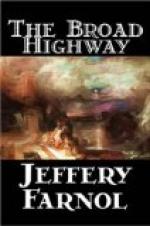“Ass!” said I. “Fool!” And, dropping my hammer, I made towards him, but he darted nimbly to the door, where, seeing I did not pursue, he paused.
“I may be a hass,” he nodded, “an’ I may be a fool—but I don’t go a-fallin’ in love wi’ ladies as is above me, an’ out o’ my reach, and don’t chuck away a ’undred guineas for one as ain’t likely to look my way—not me! Which I begs leave to say—hass yourself, an’ likewise fool—bah!” With which expletive he set his thumb to his nose, spread out his fingers, wagged them and swaggered off.
Above me, and out of my reach! One not likely to look my way!
And, in due season, having finished the horseshoe, having set each tool in its appointed place in the racks, and raked out the clinkers from the fire, I took my hat and coat, and, closing the door behind me, set out for the Hollow.
CHAPTER XIX
How I met black George again, and wherein the patient reader shall find A “Little blood”
It was evening—that time before the moon is up and when the earth is dark, as yet, and full of shadows. Now as I went, by some chance there recurred to me the words of an old song I had read somewhere, years ago, words written in the glorious, brutal, knightly days of Edward the First, of warlike memory; and the words ran thus:
“For her
love I carke, and care,
For her
love I droop, and dare,
For her
love my bliss is bare.
And I wax
wan!”
“I wonder what poor, love-sick, long-dead-and-forgotten fool wrote that?” said I aloud.
“For her
love, in sleep I slake,
For her
love, all night I wake,
For her
love, I mourning make
More than
any man!”
Some doughty squire-at-arms, or perhaps some wandering knight (probably of a dark, unlovely look), who rode the forest ways with his thoughts full of Her, and dreaming of Her loveliness. “Howbeit, he was, beyond all doubt, a fool and a great one!” said I, “for it is to be inferred, from these few words he has left us, that his love was hopeless. She was, perhaps, proud and of a high estate, one who was above him, and far beyond his reach—who was not likely even to look his way. Doubtless she was beautiful, and therefore haughty and disdainful, for disdainful pride is an attribute of beauty, and ever was and ever will be —and hence it came that our misfortunate squire, or knight-errant, was scorned for his pains, poor fool! Which yet was his own fault, after all, and, indeed, his just reward, for what has any squire-at-arms or lusty knight, with the world before him, and glory yet unachieved—to do with love? Love is a bauble—a toy, a pretty pastime for idle folk who have no thought above such —away with it!—Bah!” And, in my mind—that is to say, mentally —I set my thumb to my nose, and spread my fingers, and wagged them—even as the Postilion had done. And yet, despite this, the words of the old song recurred again and again, pathetically insistent, voicing themselves in my footsteps so that, to banish them, I presently stood still.




